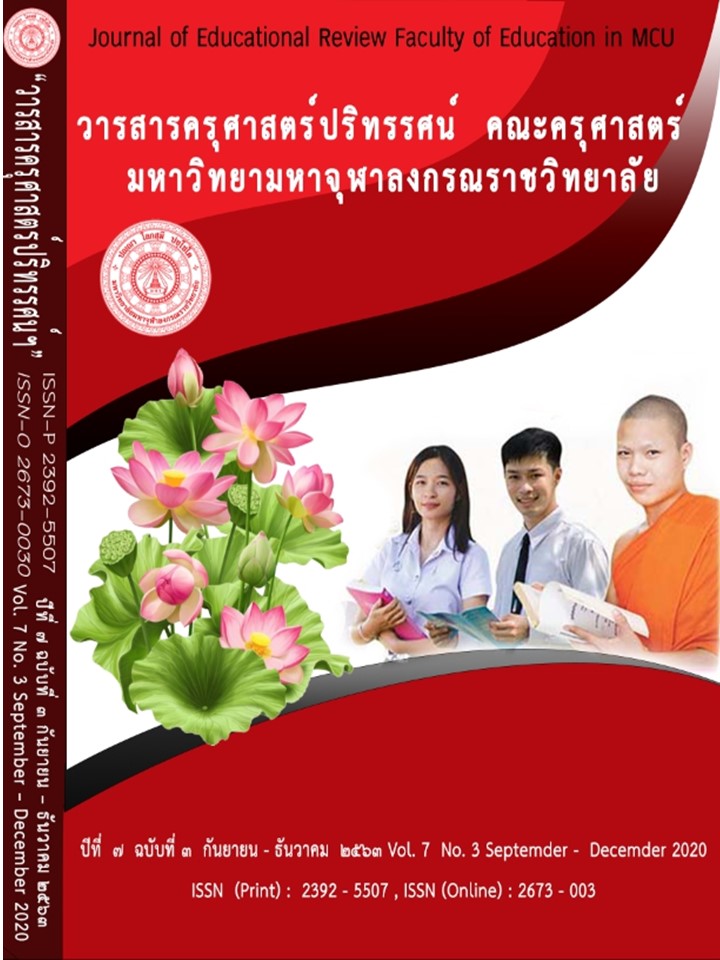A MODEL OF LEADERSHIP ACCORDING TO GARÃVÃSADHAMMA IV OF PRIMARY SCHOOL ADMINISTRATORS UNDER BANGKOK METROPOLITAN ADMINISTRATION
Main Article Content
Abstract
This research paper aimed to propose a model of leadership according to Garãvãsadhamma IV of primary school administrators under Bangkok Metropolitan Administration. Mixed methods research was conducted and three research steps were designed. Step 1: Study leadership of primary school administrators using a questionnaire to collect from a sample group of 390 primary school administrators and teachers. Data were analyzed by descriptive statistics such as percentage, frequency, mean, standard deviation. Step 2: study the leadership style of administrators according to Garãvãsadhamma IV by interviewing 24 key informants, the data was analyzed by content analysis according to the interview form. Step 3: proposing the model of leadership according to Garãvãsadhamma IV of primary school administrators under Bangkok Metropolitan Administration by conducting focus group discussion of 9 experts, the data was analyzed by content analysis based on the guideline questions for focus group discussion. The results of the research showed that a model of leadership according to Garãvãsadhamma IV of primary school administrators under Bangkok Metropolitan Administration consisted of 4 compositions: (1) Principles, (2) Goals, (3) Operational systems, and (4) Operational processes. Three areas of leadership principles of school administrators were applied which consisted of (1) the visionary, (2) Vithuro with knowledge and ability, (3) Nissayasampanno, have human relations to integrate Garãvãsadhamma IV, namely (1) truth, (2) control of emotions, (3) tolerance, and (4) sacrifice.
Article Details
ทัศนะและความคิดเห็นที่ปรากฏในบทความในวารสารฉบับนี้ถือเป็นความรับผิดชอบของผู้เขียนบทความนั้นเพียงผู้เดียว และไม่ถือเป็นทัศนะและความรับผิดชอบของกองบรรณาธิการ
กองบรรณาธิการขอสงวนสิทธิ์ในการคัดเลือกบทความลงตีพิมพ์และจะแจ้งให้เจ้าของบทความทราบหลังจากผู้ประเมินบทความตรวจอ่านบทความแล้ว
ต้นฉบับที่ได้รับการตีพิมพ์ในวารสารครุศาสตร์ปริทรรศน์ คณะครุศาสตร์ มหาวิทยาลัยมหาจุฬาลงกรณราชวิทยาลัย ถือเป็นกรรมสิทธิ์ของคณะครุศาสตร์ มหาวิทยาลัยมหาจุฬาลงกรณราชวิทยาลัย ห้ามนำข้อความทั้งหมดหรือบางส่วนไปพิมพ์ซ้ำ เว้นเสียแต่ว่าจะได้รับอนุญาตจากมหาวิทยาลัยฯ เป็นลายลักษณ์อักษร
References
ธงชัย สันติวงษ์. (2550). องค์การและการบริหาร. พิมพ์ครั้งที่ 15. กรุงเทพมหานคร: ไทยวัฒนาพานิช.
ธานินทร์ ศิลป์จารุ. (2552). การวิจัยและวิเคราะห์ข้อมูลทางสถิติด้วย SPSS. พิมพ์ครั้งที่ 10. กรุงเทพมหานคร: บิสซิเนสอาร์แอนด์ดี.
พระครูโอภาสนนทกิตติ์ (ศักดา แสงทอง), กมัยธร สัจจา. (2557). ภาวะผู้นำที่ดี เก่ง ในศตวรรษที่ 21 ในทัศนะพระพุทธศาสนา. วารสารครุศาสตร์ปริทรรศน์ คณะครุศาสตร์ มหาวิทยาลัยมหาจุฬาลงกรณราชวิทยาลัย. 1(2). 135-144.
พัชราณี ฟักทองพรรณ. (2554). แนวโน้มคุณลักษณะผู้นําที่พึงประสงค์ของผู้บริหารโรงเรียนสตรีเอกชน. ดุษฎีนิพนธ์ครุศาสตรดุษฎีบัณฑิต. จุฬาลงกรณ์มหาวิทยาลัย.
พิชาภพ พันธ์แข. (2554). ผู้นำกับการจัดการเปลี่ยนแปลง. พิมพ์ครั้งที่ 2 (ฉบับปรับปรุง). กรุงเทพมหานคร: แอคทีฟปริ้นท์.
มหาวิทยาลัยจุฬาลงกรณราชวิทยาลัย. (2539). พระไตรปิฎกฉบับภาษาไทย ฉบับจุฬาลงกรณราชวิทยาลัย. กรุงเทพมหานคร: โรงพิมพ์มหาจุฬาลกรณราชวิทยาลัย.
วันทนา เนาว์วัน. (2558). การพัฒนาภาวะผู้นำตามหลักพุทธธรรมของบุคลากรโรงเรียนพระปริยัติธรรม แผนกสามัญศึกษา กลุ่ม 3. ดุษฎีนิพนธ์พุทธศาสตรดุษฎีบัณฑิต. มหาวิทยาลัยมหาจุฬาลงกรณราชวิทยาลัย.
วิมล จันทร์แก้ว. (2555). รูปแบบการพัฒนาภาวะผู้นําเชิงสร้างสรรค์ของผู้บริหารโรงเรียน สังกัดสำนักงานเขตพื้นที่การศึกษาประถมศึกษาสุราษฎร์ธานี เขต 3. ดุษฎีนิพนธ์ปรัชญาดุษฎีบัณฑิต. มหาวิทยาลัยศิลปากร.
สมบูรณ์ สุขสำราญ. (2560). ปรัชญาแนวพุทธ. กรุงเทพมหานคร: มหาวิทยาลัยรามคำแหง.
Adams. Robert P. Juniperus. (1993). Flora of North America Editorial Committee. Flora of North America North of Mexico. 2. Oxford University Press.
Boone. E. J. (1992). Developing programs in adult education. Prospect Heights. Brooklyn: Waveland Press.
Daniel Yoshor. Eli M. Mizrahi. (2012). Response of the personal muscles to sudden inversion stress during standing. New York: McGraw-Hill.


